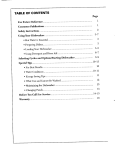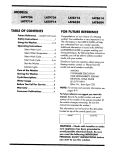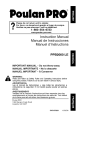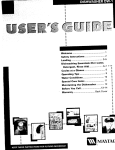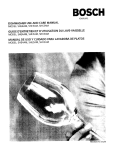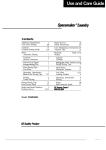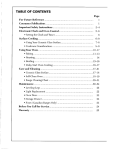Download TABLE OF CONTENTS
Transcript
TABLE OF CONTENTS
Page
For Future Reference
................................................................................
1
..............................................................................
1
......................................................................................
2
Consumer Publications
Safety Instructions
Using Your Dishwasher ..............................................................................
3-7
• Hot Water is Essential ........................................................................
3
• Preparing Dishes .................................................................................
3
• Loading Your Dishwasher ..................................................................
3-5
• Using Detergent and Rinse Aid .........................................................
6-7
• Connecting a Convertible Dishwasher ..............................................
7
Selecting
Cycles and Options/Starting
Dishwasher
.............................
Special Tips ...................................................................................................
8-9
10-13
• For Best Results ..................................................................................
10
• Water Conditions ................................................................................
10-11
• Energy Saving Tips .............................................................................
11
• What Can and Cannot Be Washed .....................................................
12
• Caring for Dishwasher ........................................................................
13
• Changing Panels ..................................................................................
13
Before You Call For Service .....................................................................
Warranty .......................................................................................................
14-15
16
FOR FUTURE REFERENCE
Congratulations on your choice of a Maytag
Jetclean dishwasher. As you use your new
dishwasher we know you will appreciate the
many features that provide unsurpassed
cleaning and capacity along with energy
efficiency and dependability,
For future reference we suggest you retain this
manual after recording the model number and
serial number of this dishwasher in the spaces
provided. This information can be found on the
data plate located on the upper left comer of the
tub opening.
On the following pages you will find a wealth of
information regarding all aspects of your
beautiful new dishwasher. By following these
instructions carefully, you will be able to achieve
excellent results with your dishwasher. Should
you have any questions about using your Maytag
dishwasher, contact us. Be sure to provide the
model number of your dishwasher.
I
TM
MAYTAG COMPANY
CONSUMER EDUCATION
ON E D E PE NDAB ILITY SQUARE
NEWTON, IOWA 50208
(515) 791-8911
(Mon.-Fri., 8 am-5 prn CST)
CONSUMER
Model Number
I
Serial Number
WARNING - Check with Installer to
make sure appliance
has been
grounded
to avoid possible electrical
shock. Be sure you read the
IMPORTANT PERSONAL SAFETY
INSTRUCTIONS on page 2 before you
start to use this dishwasher.
PUBLICATIONS
For additional information order the following booklets from Maytag at the prices indicated. Send your
name, address, booklet title, form number and payment to: Consumer Education Dept., Maytag Co., One
Dependability Square, Newton, IA 50208. Allow 6-8 weeks for delivery.
Innovative Ideas for Today's Kitchens -- 22PR ..................................... $1.00
Before You Call (Appliance Servicing Tips) -- 206YG ............................ 50¢
Appliance Buying Guides ..............................................................
50¢ EACH
Washer -- 211YG
Dryer212YG
Dishwasher -- 213YG
Electric Range -- 214YG
Gas Range -- 215YG
Refrigerator -- 276YG
PAGE 1
IMPORTANT
PERSONAL
SAFETY INSTRUCTIONS
Products with a (_) label have been listed with
the Underwriters'
Laboratories, Inc. - those with
a CSA tag have been listed with Canadian
Standards Association. Nevertheless, as with any
other equipment using electricity and moving
parts, there is a potential hazard. When using
your dishwasher, follow basic precautions,
including the following:
1. Read all instructions before using the
dishwasher.
8. Be careful not to touch the heating element
on the bottom of the tub during or at the
completion of a cycle. It may be hot.
9. Use only detergents and rinse additives
designed for an automatic dishwasher. Never
use soap, laundry detergent, or hand
washing detergent in your dishwasher. Keep
these products out of the reach of children.
10. Do not sit, stand on or abuse the door or
2. Use the dishwasher only for its intended
function.
dish racks of the dishwasher.
11. Under certain conditions, hydrogen gas may
3. Disconnect electrical power to dishwasher
before attempting to service,
be produced in a hot water system that has
not been used for two weeks or more.
4. To avoid electrical shock hazard, the sides
and back must be enclosed, and the front
Hydrogen
panels must be attached before electrical
power is applied to the dishwasher. Refer to
the installation instructions for proper
grounding procedures.
5. Connect to a properly rated, protected and
sized power supply circuit to avoid electrical
overload.
6. Children should never be permitted to
operate, or play in, with, or around this
dishwasher,
7. To reduce the risk of injury when loading
items to be washed, sharp or pointed items
should be located with the handles up. Also,
load sharp items so they are not likely to
damage the door seal.
SAVE
PAGE 2
THESE
gas is explosive.
If the hot water
• system has not been used for such a period,
turn on all hot water faucets and let the
water flow from each for several minutes.
This will release any accumulated hydrogen
gas. As the gas is flammable, do not smoke or
use an open flame during this process.
12. Do not wash plastic items unless marked
"dishwasher safe" or the equivalent. For
plastic items not so marked, check the
manufacturer's recommendations.
13. Do not tamper with controls.
14. Always remove the door to the washing
compartment when removing an old
dishwasher from service or discarding it.
INSTRUCTIONS
USING YOUR DISHWASHER
Hot
Water
is Essential
For proper performance of your dishwasher, hot
water is necessary to activate the dishwasher
detergent and melt fatty food soils. Set your
water heater to deliver 120°F water to the
dishwasher. If, for any reason, the temperature
of the water being delivered by the water heater
should be below 120°F, select the Temp Boost
Sensor option to have your dishwasher heat the
water until proper temperature is reached.
To check water temperature, turn on the hot
water faucet nearest the dishwasher. Let water
run into a glass in the sink until it is as hot as
possible, then check with a candy or meat
thermometer. If the temperature at the faucet is
below 120°F (49°C), have a qualified person
raise the water heater thermostat setting,
Preparing
Dishes
Loading
Your
Dishwasher
Seldom will households have identical dishes;
the number and type of articles used will vary
daily. Your dishwasher is designed to be flexible
and accommodate a wide variety of dishes and
utensils. The following instructions and pictures
will help you become familiar with your
dishwasher. With experience, you will learn the
best arrangement for your particular needs.
General
Recommendations
• Place all items on racks so they are separated
and
insure the
spray
will face
reachthe
thecenter
soiled tosurfaces.
Do water
not allow
items to extend out of the racks.
• Make sure the movement of the upper and
lower spray arms is not blocked by items
hanging below the lower rack or tall articles in
the upper rack.
• It is not necessary to rinse dishes before
placing them in your Maytag dishwasher,
Simply scrape off bones and large pieces of
food. The food disposer in your dishwasher
can handle a variety of items such as pits, fruit
• Insure the free flow of water to the detergent
cup by not blocking it with large items.
• Larger, fiat, lightweight items (such as plastic
covers) may be wedged next to the silverware
basket or along the sides and back of the racks.
seeds, popcorn and toothpicks. These items
will be chopped into small pieces during drain
and removed with the drain water. If hard
items get into the dishwasher module, you
may hear chopping noises during drain. These
sounds are normal.
• The wash tower rises through the center of the
lower rack during the cycle. For the best
cleaning results, avoid blocking it or loading
tall articles next to it.
• Foods that have been burned onto cooking
utensils will need to be scraped or soaked.
• Certain foods, such as mustard, mayonnaise,
lemon juice, vinegar, salt or dressings may
cause stainless steel flatware to rust and pit if
allowed to remain in contact with the surface
for a period of time. Therefore, it is best to
rinse these food soils off stainless steel flatware
unless the dishwasher is to be operated soon
after loading.
• If your dishwasher drains into a food waste
disposer, make certain the disposer is
completely empty before starting the
dishwasher to provide for proper draining.
PAGE 3
Upper
Rack
The upper rack of your dishwasher is designed
with flexibility in mind. Glasses, cups, small
plates, bowls, pans, etc. can be loaded in many
different positions to suit your needs.
When loading glassware, leave a small space
between each piece so they do not touch each
other during the wash cycle. Do not p/ace
glasses over the tines.
The rack is designed so dishes can be centered
behind a single tine and held in place by the
rack's support wires. Dishes can also be loaded at
an angle to maximize space.
\
¢
The upper rack may be removed if desired.
Push inward on the front of the rack rail ends to
unsnap. Remove rail ends and pull out rack.
To replace rack: reinsert rack, place rail ends in
position and snap fronts into place by pushing
outward.
PAGE 4
Lower
Rack
Large dinner plates and other dishes may be
placed in any convenient location in the lower
rack but soiled surfaces should face the
center.
Tall items such as bakeware and large platters
should be loaded on the left side of this rack.
Small items such as plates, saucers or shallow
bowls may be loaded in the elevated area behind
the wash tower.
Flatware
Put flatware in the removable silverware basket,
mixing knives, forks and spoons. To prevent
them from nesting together, place some handles
up and some down. However, sharp or pointed
items should be loaded with the handles up.
The silverware basket may be removed for ease
of loading or unloading.
Use the covered section for small, lightweight
articles such as measuring cups and spoons,
The convertible bowl tines in the right rear
comer can be folded to provide either narrow or
wide spacing. This allows flexible loading of a
variety of articles such as serving bowls, plates,
pans or casserole dishes.
small plastic items, baby spoons, etc. Lower the
cover to keep these items in place.
PAGE 5
Using Detergent
Aid
and Rinse
Detergent
Use only a powder or liquid detergent designed
for an automatic dishwasher. Never use soap,
laundry detergent or hand dish washing
detergent in your dishwasher as it will cause
severe oversudsing. Use fresh detergent and
store it in a cool, dry place (not under kitchen
For water hardness over 12 grains, add
additional detergent (1 teaspoon for each grain
over 12) at the beginning of the main wash
portion of the cycle. (Open door, add detergent
to bottom of tub, close door and dishwasher will
continue through cycle.)
If water is 15 grains or harder, it will be virtually
impossible to get good results with any
dishwasher. The only solution is a mechanical
water softener to improve water quality.
sink).
Adding
Recommended
Amount
to Use
The amount of detergent to use depends on the
Add Detergent to Dispenser Cup Just Before
You Select the Cycle and Options.
water hardness (measured in grains per gallon-gpg) and the amount of soil on the dishes.
Generally detergent amounts should be
increased for harder water and heavier soil.
Normal
Too little detergent can result in poor cleaning,
hard water filming and spotting, and poor drying.
Overuse of detergent (especially in chemically
softened water) can cause permanent etching
(cloudiness) of glassware. For detergents with
low phosphate content (8.7% or less) the usage
level may have to be increased. The phosphate
content is shown on the side of the box.
A basic guideline is one teaspoon of detergent
for each grain of water hardness (gpg). Use a
minimum of three teaspoons (one tablespoon) in
soft water. Refer to the chart below.
WATER HARDNESS*
DETERGENT USE
Soft (0-4 grains)
1-2 Tbs.
(fillcup to first line)
Medium (5-8 grains)
2-3 Tbs.
(fillcup to second line)
Hard (9-12 grains)
3-4 Tbs.
(fill cup to third line)
*Yourlocalwaterutilitycan tellyouthe exactdegreeof
hardnessofyourwatersupply.In rural areas,yourstate
universityextensionservicecan tell youhowto test your
waterhardness.
PAGE 6
Detergent
Cycle or Pots & Pans
Place proper amount of detergent in both the
Prewash and Main Wash cups. Close the lid.
Detergent will be released automatically into the
prewash and main wash.
Light/China
Place the proper amount of detergent in the
Main Wash cup only. Close the lid. The
detergent will be released automatically into the
main wash.
Rinse & Hold
Do NOT use detergent in this cycle.
Rinse
Aid
Pull faucet connector from recess in back of
dishwasher as shown.
Your Maytag dishwasher features an automatic
rinse aid dispenser, located near the detergent
dispenser on the door interior. Using a rinse aid
improves drying results and reduces spotting and
filming.
._I
To fill, turn dispenser cap counterclock'Mse to
open. Remove cap and pour liquid rinse additive
into the opening. Replace cap and turn clockwise
to close.
The clear indicator in the center of the cap
changes from dark to light when the reservoir is
nearly empty, This indicates that it is time to
refill the dispenser.
Press down on thumb release. Lift connector up
on to faucet and remove pressure from thumb
release to hold connector firmly in place.
Turn on hot water faucet full force.
Be sure the sink drain is open so that water from
the dishwasher will properly drain.
Pull electric cord from the back of the
dishwasher and plug into a properly grounded
electrical outlet.
i
Button
Caring
Connecting
Dishwasher
a Convertible
Turn on the hot water faucet and allow water to
run until water coming from the faucet is hot,
Shut off.
for the Wood
Top
Before using a eonvertible dishwasher for the
first time, wipe the wood top with a damp cloth
to remove surface dust and then dry. Saturate
cloth with mineral oil and apply a heavy coat to
the wood top. Let stand overnight. The next day
apply a thin coat of mineral oil and rub with a
soft dry cloth. Repeat every few months to
maintain the appearance of the wood top.
PAGE 7
SELECTING
CYCLES AND OPTIONS/STARTING
DISHWASHER
APPROX.
CYCLE SETTING
SEQUENCE
CYCLE TIME
WATER USE
7 Min.
2 Gal.
RINSE & HOLD:
Use to rinse a relatively few soiled dishes
which are to be held until the dishwasher is
full. Turn knob to Rinse & Hold.
Rinse
LIGHTCHINA:
Use for china and crystal and for loads
Rinse
containing medium to light amounts of soil.
Turn knob to Light/China.
Main Wash /
2 Rinses
Dry
NORMAL
]
7 Gal.
---
41 Min.
35 Min.
76 Min. + Heating Delay*
CYCLE:
Use for washing loads containing normally
soiled dishes. This would include dishloads
PreWash
Rinse
with problem soils. Turn knob to Normal
Cycle.
Main Wash
2 Rinses
Dry
9 Cal.
---
49 Min.
.-35 Min.
84 Min. + Heating Delay*
POTS & PANS:
Use for loads with heavy or dried soils. Turn
knob to Pots & Pans.
PreWash
2 Rinses
Main Wash
2 Rinses
Dry
11 Gal.
._
64 Min.
--35 Min.
99 Min. + Heating Delay*
*The TEMP BOOST SENSOR may extend the main wash to heat the water to proper temperature. The HEATING
DELAY indicator will light when the cycle is being extended due to low water temperatures.
PAGE 8
Options:
Temp
Indicator
Boost
Sensor:
Light:
The Heating Delay light indicates that the main
If for any reason the incoming water
temperature is below 120°F, press the On
button to assure the water is heated to proper
wash is being extended to heat the water to
proper temperature.
temperature for best cleaning and drying
results. The main wash will be extended and the
Adding a Forgotten
Heating Delay light will turn on.
For best cleaning, the forgotten item should be
Press the Off button to cancel the Temp Boost
Sensor.
added early in the cycle.
1. Unlatch the door and wait until the sound of
Item:
circulating water stops.
Fan Dry Options:
Press the Heat button to turn the heating
element on during the fan dry period. This
option provides faster drying,
2. Open the door and add the item.
3. Pause before latching the door. The cycle will
continue at the point it was interrupted.
Press the Air button to turn the heating element
off during the fan dry period.
To Start
Dishwasher:
After loading set the dial to the desired cycle.
Press button for desired options.
NOTE: Run the water from the hot water tap to
clear the line of cold water before
starting,
Press the door until it latches. The cycle will
begin with a drain prior to fill.
PAGE 9
SPECIAL
TIPS
tointerfere
themovement
oftheupper
or lower spray arms.
For Best Results
• Hot Water is a Must
Hot water dissolves and activates the
dishwashing detergent, dissolves grease on
dishes and helps dry glasses spot-free. Make
certain all loads are washed in hot water. Three
ways to have a reliable hot water suppl}a..
1. Maintain a minimum 120°F (49°C) water
supply at the central water heater. To check
water temperature, refer to page 3.
2. If your hot water is below 120°F (49°C), it
will be necessary to select Temp Boost
Sensor On to achieve good results. The
Temp Boost Sensor will add heat during
the main wash and thermostatically check
the water temperature. If the proper
temperature is not reached during the
standard .main wash time, the Heating
Delay light will come on and the cycle will
be delayed until the temperature is
reached.
3. Let the water from the hot water tap run to
clear the line of cold water before selecting
a cycle.
• Use Enough Detergent
• Select the Proper Cycle
The cycle needed depends on the amount of
food soil. See page 8 for cycle descriptions.
• Select Heat Dry
For faster drying select Heat Dry.
Water Conditions
• Hard Water Deposit
If an unusual amount of calcium is in the
water, a lime film or deposit may eventually
build up on the dishes and interior surface of
dishwasher. You may first notice this as
"cloudy" glasses.
To determine if the film on the glasses is
due to hard water, soak a glass
approximately 15 minutes in undiluted
white vinegar. Rinse and dry. If film is
removed, it is due to hard water (if not
removed, see Soft Water Etching).
To correct:
1. Increase the amount of detergent used
according to the degree of water hardness
(see page 6).
2. Check the water temperature (see page 3).
For proper soil removal and to prevent
filming, etching and spotting, an adequate
amount of detergent must be used. We
recommend 1 teaspoon of detergent per grain
of water hardness with a minimum of 1
action of the water (see page 7).
To remove film from dishwasher interior, try
one of the following:
tablespoon. Refer to page 6 on adding
detergent,
1. Remove with a damp cloth and a mild
scouring powder.
• Use a Rinse Aid
Using a rinse aid improves drying results and
reduces spotting and filming. See page 7 for
instructions on using a rinse aid.
• Load the Dishwasher Properly
To insure that all soiled surfaces get adequate
wash action, carefully follow the instructions
for loading the dishwasher (pages 3-5). Make
sure nothing extends above or below the racks
PAGE 10
3. Use a rinse aid to improve the sheeting
2. Start empty dishwasher on Rinse & Hold
cycle. During fill, open door and add 1/2
cup white vinegar to water. Allow
dishwasher to complete cycle. Do not use
detergent. Follow with a regular detergent
wash.
3. Use Lime-A-Way according to
manufacturer's directions.
• Soft Water Etching
2. Start empty dishwasher on Rinse & Hold or
If the cloudy film is not removed after soaking
in vinegar (previous procedure), then the
condition is etching. This permanent film
occurs in unusual conditions under which the
rinse portion of the cycle. During fill, open
the door and add 1/2 cup RoVer Rust
Remover to the water. Allow the
dishwasher to complete the cycle.
surface of the glass is pitted or eroded. It is
3. Follow with a detergent wash.
permanent.
In the beginning stages, etching may be
identified by a "rainbow" look--shades of blue,
purple, brown or pink may be seen when the
glass is held at an angle to the light. In
advanced stages the surface of the glassware
appears frosted, spotted or cloudy.
The only permanent solution is to install
special filters which can remove iron and
manganese from the water.
Energy Saving "lips
Certain types of glassware will etch in any
dishwasher with the combination of soft water
(especially mechanically softened), an
excessive amount of detergent, heat and
prerinsing. There is no relationship to the cost
You can help save energy if you:
or quality of the glass.
To prevent:
2. Do not pre-rinse normally soiled dishes.
Select the correct cycle for the load and use
1. Adjust the amount of detergent to the
degree of water hardness (see page 6).
2. Lower the water temperature
(see page 3).
1. Wash full loads. Running a half-filled
dishwasher uses the same amount of
electricity and hot water as a fully loaded
machine.
the recommended amount of detergent for
good washing results without hand rinsing.
3. Avoid using the Heat Dry drying option,
3. Load correctly for best washing results.
Incorrect loading may cause poor washing and
the need to prewash all or part of the load.
4. Do not manually prerinse dishes before
loading in dishwasher. Prerinsing prior to
loading to remove all food soil aggravates
4. Use the Light/China cycle when dishes are
lightly soiled. It uses less hot water and energy
than other cycles.
etching.
• Rust
Sometimes the dishes or the interior of the
dishwasher may turn a brown, red or black
color if iron or manganese is in the water. To
remove discoloration from dishwasher interior,
dishes and glassware (no metal items):
1. Select a rust removing compound, such as
RoVer Rust Remover. It is available from
Maytag Parts Distributors
No. 57961.
5. Fan dry dishes (without heat) when you don't
need a rapid drying cycle. Allow longer drying
times (overnight).
6. Use your dishwasher during off-peak hours.
Local utilities recommend this to avoid heavy
usage of energy at certain times of day. Check
with your utility company to see if off-peak
rates exist.
by using Part
PAGE 11
What
Can and Cannot
Be
manufacturer,
Washed in Your Dishwasher
Most tableware,
eookware
and silverware
several weeks before
entire set.
safe. If you cannot
Dishwasher
Safe?
Material
,i,!! ! i,,, !_!, ,,i,
attempting
a small item for
to wash an
can be
safely washed in your Maytag dishwasher. If you
have any doubts about a particular piece of
dishware, check with the manufacturer
to see if
it is dishwasher
simply test-wash
REMEMBER:
It is the user's responsibility
to
determine ifdishware
should be washed in a
dishwasher.
reach the
Special Information
Dishwasher
Safe?
Mate_
Special Information
[
_mm_:
Yes, except
High water temperature and
anodized alu- detergents may affect finish,
:Pewter
minum and
::
some
Check cleaning instructions.
:
: : No
:
High water temperatures
and detergent may
discolor or pit finish.
cook-
ware.
No
No
Cannot withstand high
water temperatures
detergents.
Seasoning will be removed,
and
andironwillrust.
Plastics
Yes, except
antique or
hand-painted
china,
....
Yes
(If labeled
"dishwasher
safe")
Always check
manufacturer's
recommendation before
washing. Plastics vary in
their capacity to withstand
high water temperatures
and detergents.
Yes
Always check manufacturer's
recommendation before
washing. Some types of
leaded crystal may etch
with repeated washings.
If in doubt, test-wash a
Run a Rinse & Hold Cycle
(select models) if not
washing immediately. Prolonged contact with foods
containing salt, vinegar,
milk products or fruit juice
could damage finish.
Yes, except
Run a Rinse & Hold Cycle
small item for several
weeks before washing an
entire set.
those with
commercial
darkening .
(select models)if not
washing immediately. Prolonged contact with food
containing salt, acid or
sulfide (eggs, mayonnaise
and seafood) could damage finish. Commercial
"darkening" may be
removed by detergent.
No
May rust.
No
Always check manufacturer's recommendation
Always check manufacturer's
recommendation before
washing. Antique handpainted or over-the-glaze
patterns may fade. Gold leaf
may discolor. If in doubt,
test-wash a small item for
..........
:{
several weeks before
washing an entire set.
Yes, except
antique or
lightweight
delicate
crystal,
....
............
':
:
Yes, except
milkglass,
Milkglass will yellow with
repeated dishwasher
washing,
No
Will discolor.
Steel
:.
......
Plated
Flatware
No
Knives
:
::
PAGE 12
Handles may be attached
to the blade with adhesives
which may loosen if
dishwasher washed,
:
items
.
I
:
before washing. Wood
may warp, crack or
discolor.
Caring
For Dishwasher
To Change Panels:
The interior is normally self-cleaning.
Occasionally check the bottom of the dishwasher
tub and clean out pieces of food which may
A. Remove three screws holding the metal trim
strip on one side of the door. Take note of
how the trim comes off.
collect there.
B. Grasping the lower part of the door panels,
Periodically clean the bottom edge of the
dishwasher door liner. Food and liquids drip
onto this area when the dishwasher is loaded,
If you notice an odor in your dishwasher, it may
be due to a strong "chemical" or chlorine odor
from the dishwasher detergent. Using a different
detergent, especially a lemon scented one, will
probably eliminate the odor. In some instances
the smell of the rinse additive may be strong,
Purchase a fresh package and see if it is better,
Lastly, if the dishwasher is run only every couple
of days, an odor may develop. Use the Rinse &
Hold feature daily to remove any food soil that
may cause an odor.
To remove an odor, try one of the following:
1. Place baking soda in both sides of the
detergent dispenser. Select Light/China and
let the water circulate for about 10 minutes,
Stop the dishwasher by unlatching the door
and let stand overnight. Then, restart the
dishwasher by latching the door and let it
complete the cycle.
2. Select the Light/China cycle and let the
dishwasher fill with water. Then open the
door and pour one cup of chlorine bleach into
the bottom of the dishwasher. Latch the door
and let the dishwasher complete the cycle,
Clean the control panel and front panel with a
soft damp cloth and liquid spray cleaner. Do not
use any abrasive powders or cleaning pads.
bow panels out carefully at the bottom while
sliding panels far enough to clear the flange
on the trim strip which was not removed and
remove panels.
C. Arrange panels so the desired color is facing
out.
D. Place door panels (notched side up) behind
the metal trim at the bottom of the door. Bow
the panels so they fit behind the control
panel at the top.
E. Slide the panels under the side metal trim
which was not removed. To do this, it will be
necessary to compress the backing behind
the colored panels.
E Reinstall the metal trim which was removed
earlier. To do this, start by inserting the tip
end of the trim strip behind the control
panel. Align the holes and replace the three
screws.
G. The lower access panel is held by four screws
(two above the panel and two below). With
these removed, the panel may be removed to
make it easy to change panel colors.
H. With the lower access panel removed,
remove the four screws along the bottom of
panel and remove the trim which holds the
panels. Once the desired panel is facing out,
replace the trim, and reinstall the panel to
the dishwasher.
Use care when changing panels to be certain you
Changing
Panels
Your Maytag dishwasher comes with reversible
panel inserts which are pre-assembled at the
factory. This enables you to select the color you
want before your dishwasher is installed or
choose another color at a later date.
are not injured on sharp edges and that the
panels are not damaged. If you have any
questions concerning changing panels, contact
your local Maytag Dealer.
PAGE 13
BEFORE YOU CALL FOR SERVICE
Check these points ff your dishwasher...
Does not dry properly
Leaves food soil on dishes
• Check to see that the water heater is set to
deliver at least 120°F water at the faucet.
• Turn on hot water at kitchen sink before
• Be sure the Heat Dry option is selected.
• Use a rinse agent such as Jet-Dry.
running the dishwasher to be certain that
hot water is entering the first wash cycle,
nearest the dishwasher. Run water and
check
temperature with a candy
thermometer.
• Check to see that the water heater is set to
deliver at least 120°F water at the faucet
• Select Temp Boost option if available.
• Check water hardness. For extreme hard
water conditions it may be necessary to
install a mechanical water softener.
• Select Temp Boost and Sani Rinse options if
available.
• Use the amount of detergent recommended
for your water hardness, and be sure it is put
in the dispenser as directed previously.
• Use fresh high phosphate detergent that is
not caked. Store detergent in cool, dry place.
• Check for improper loading and do not
overload. Dishes should not nest together.
• Select proper cycle for soil level of dish load.
required.
• Glasses, cups, etc., with concave bottoms
will hold water.
• Be sure dishes are loaded properly with
nothing blocking the path of the wash arms,
center spray nozzle or detergent dispenser,
• Check for nesting of dishes that prevents
water from reaching all surfaces.
• Check to make sure glasses are not loaded
over prongs,
• On convertible models make certain the hot
water faucet is turned on.
Leaves glassware cloudy or spotted
• Adjust the detergent amount to your water
hardness as described earlier in this book.
Avoid overuse or underuse of detergent.
• Check to see that the water heater is set to
deliver at least 120°F water at the faucet
nearest the dishwasher. Avoid extremely
high or low temperatures,
• Use a rinse agent such as Jet-Dry.
• Do not pre-rinse dishes before loading them
into the dishwasher.
• Refer to Water Conditions for more
information,
• Increase detergent use according to water
hardness.
• Plastic items have a porous surface and tend
to hold water. Towel drying may be
• When using Quick Cycle (select models),
towel drying is required.
Stains or discolors dishes
• Aluminum utensils can leave marks when
they rub against other things. Load properly.
• Iron deposits in the water can leave a yellow
or brown film on dishes. You may desire to
have a special filter installed in the water
supply line, or periodically use RoVer Rust
Remover (see Water Conditions).
Cycle takes too long - (Heating Delay light
stays on)
• Temp Boost option has been selected
which will extend the cycle to heat water
thermostatically.
• Check to see that the water heater is set to
deliver at least 1200F water.
"Clean" light remains on (select models)
• On timer models turn dial slightly clockwise
until light shuts off.
• On touch control models Clean stays lit until
the door has been open longer than 30
secouds.
PAGE 14
/ ........
BEFORE
YOU
CALL
FOR SERVICE
continued)
Detergent
•
Seems noisy
• Water circulation noise is normal.
• Humming during drain is normal,
cup did not empty completely
Check to see that the cycle has been
completed.
• Be sure dispenser is not blocked from wash
action.
• Dishes may not be loaded properly. Dishes
should not be touching one another,
• Wash arm may be hitting an item when
rotating. Load items so nothing blocks the
wash arm.
• Be sure dispenser is not wet when detergent
is added.
• Make sure large items placed in the front
right corner of upper rack are not blocking
the detergent cup.
• Chopping or grinding noise may be heard
during drain when the internal food disposer
• Use fresh detergent.
Leaks
is chopping hard items such as fruit seeds,
nuts, etc.
Store in dry, cool place.
• Check to see that the dishwasher is level as
described in the Installation Instructions.
• Detergent cup lid hits door liner when
• Suds can cause the unit to overflow so
dishwasher door is opened at end of cycle
and is normal,
• Installation (location, flooring, cabinetry,
etc.) can affect noise level.
• Water valve hiss during fill is normal,
measure detergent carefully. Try another
brand of detergent. Use only detergents
designed for automatic dishwashers.
• Make sure you follow directions on how to
add a forgotten item.
Does not run properly/Won't
Has an odor
J;ll
• Be sure door is tightly closed and latched.
• Check to see that water is turned on.
• Soiled dishes held too long in the
dishwasher can create an odor, therefore we
• The cycle is not properly selected. Be sure
the dial is turned far enough or the cycle pad
is completely depressed.
• Cycle will start with drain,
• Check your home's circuit breaker or fuse
box.
recommend using the Rinse & Hold cycle if
available.
• Dishwashers will have a "'new" smell when
first installed.
• Dishwasher not draining properly. (See
"Does not drain properly")
• Inlet hose may be kinked.
Chips dlshware
• Water inlet valve may be clogged with
sediment and in need of cleaning,
• Be sure dishes are loaded according to the
instructions so they do not strike together
Does not drain properly
• Check to see that the cycle has been
completed,
• The dishwasher may be at a pause between
cycles which is normal,
from the wash action.
• We do not recommend washing fine antique
china and crystal in the dishwasher.
• Do not load glasses over rack tines, or allow
to touch each other.
• Drain hose may be kinked.
• Do not overload.
• Check your home's circuit breaker or fuse
box. Reset if necessary,
• Food is backing up in the pipes at the sink.
If hooked up to a food waste disposer_ be
sure to run the disposer regularly.
• Some water is normal and keeps seals from
drying.
For further assistance contact your Maytag
dealer or call Maytag Customer Assistance:
U.S.
1-800-688-9900
CANADA
1-800-688-2002
PAGE 15
DISHWASHER
WARRANTY
Full One Year Warranty
Any part which fails in normal home use during the first year after the date of original retail purchase, will be repaired or
replaced free of charge.
Limited Two Year Warranty
Any part which fails in normal home use during the second year from the date of original retail purchase, will be repaired or
replaced free of charge for the part itself, with the owner paying all other costs, including labor.
Limited
Five Year Warranty on Jetelean
System and Solid State Controls
Any parts of the Jetelean system including the complete power module assembly, center spray nozzle, spray arms, top wash
arm hose, motor, AND---on Computer Touch Control Models only--any microprocessor and touch pad assemblies which fail
in normal home use during the second through the fifth year from the date of original retail purchase, will be repaired or
replaced free of charge for the part itself, with the owner paying all other costs, including labor.
Limited Five Year Warranty
Against Rust
Should any of the parts listed below rust during the five year period starting from the date of original retail purchase, repair or
replacement will be made free of charge during the first year. After the first and through the fifth year, repair or replacement
will be made free of charge for the part itself, with the owner paying all other costs, including labor. Parts covered by this
warranty are the exterior cabinet and front panels of convertible models; the exterior front panels of built-in models, and
Nylon coated racks (available on select models).
FULL TWENTY Year Warranty
Against Leaks on Dishwasher
Tub and Door Liner
Should a water leak develop in the tub or door liner in normal home use during the TWENTY YEAR period starting from the
date of original retail purchase, repair or replacement of the tub and/or door liner will be made FREE OF CHARGE.
These full warranties and the limited warranties apply when the appliance is located in the United States or Canada.
Appliances located elsewhere are covered by the limited warranties only, which include parts which fail during the first year.
Canadian
Residents
This warranty covers only those appliances installed in Canada that have been listed with Canadian Standards Association
unless the appliances are brought into Canada due to transfer of residence from the United States to Canada.
TO RECEIVE
First:
WARRANTY
SERVICE
To locate an authorized service company in your area, contact the Maytag dealer from whom your appliance was
purchased or call Maytag Customer Assistance:
US
1-800-688-9900
CANADA
1-800-688-2002
or check in your telephone directory yellow pages.
Second:
Should you not receive satisfactory warranty service from the dealer or authorized service firm, or need further
assistance, call or write:
Maytag Customer Assistance
effo Maycor Appliance Parts and Service Co.
A division of Maytag Corporation
P.O. Box 2370
Cleveland, TN 37311
US
1-800-688-9900
CANADA
1-800-688-2002
When contacting Customer Assistance be sure to provide the model and serial number of your appliance, the name
and address of the dealer from whom you purchased the appliance, and the date of purchase.
This Warranty gives you specific legal rights, and you may also have other rights which vary from state to state.
Should you still have a problem, write to: Major Appliance Consumer Action Panel, 20 North Wacker Drive, Chicago,
Illinois 60606. MACAP is an industry sponsored but independent group of consmner experts who receive and act on
complaints from appliance owners.
NOTE: When writing about an unsolved service problem, please include the following information:
(a) Your name, address and telephone number;
(b) Model number and serial number (found on the upper left comer of the tub opening) of your appliance;
(c) Name and address of your dealer and date the appliance was bought;
(d) A clear description of the problem you are having;
(e) Water hardness, detergent brand and amount, water temperature, and cycle used.
PAGE 16

















